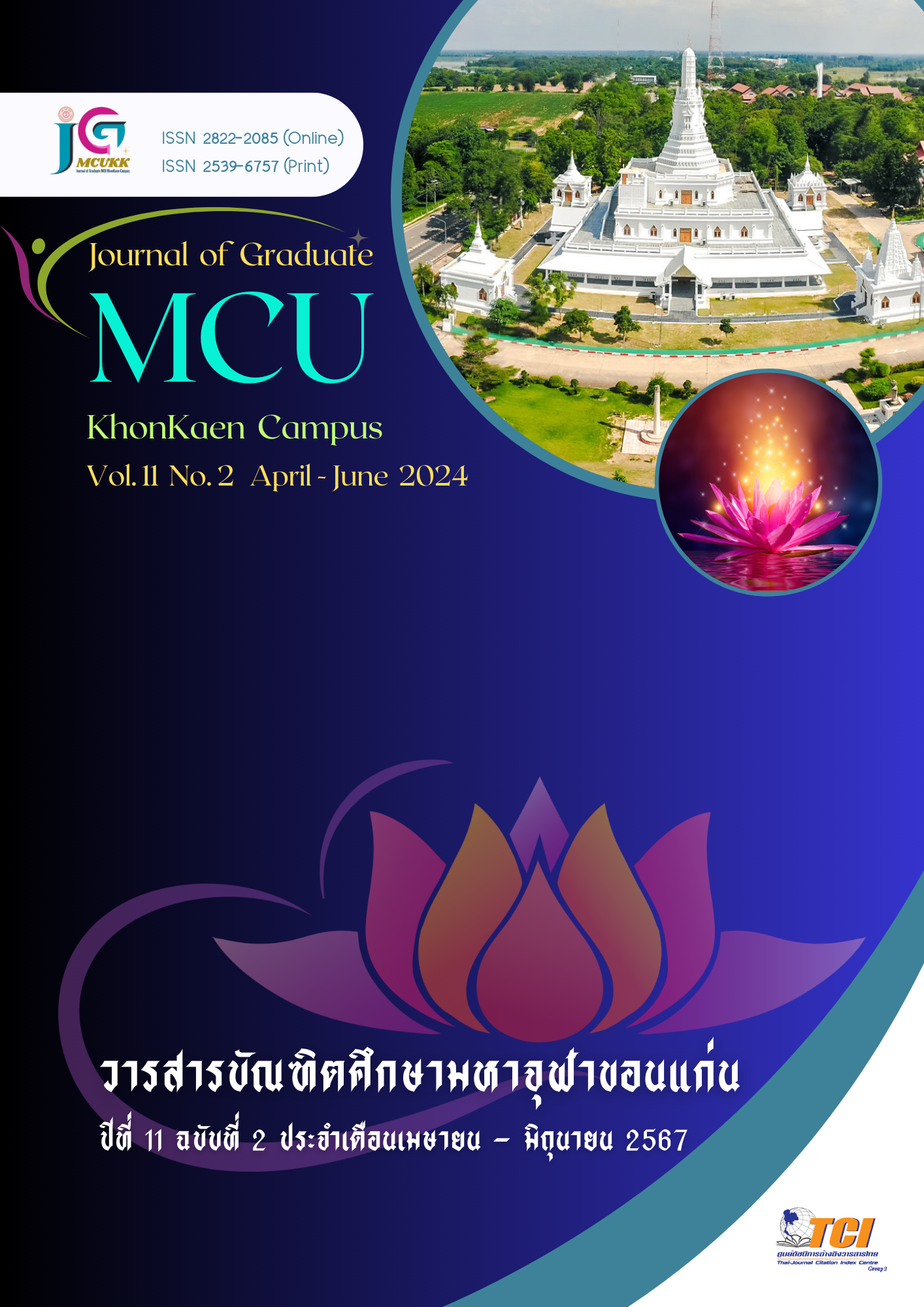Digital Leadership Development Guidelinesof Sarasas Affiliated Schools Administrators
Main Article Content
Abstract
The objectives of this research are to study 1) the current condition desired conditions and necessary needs for the development of digital leadership of school administrators in the Sarasas affiliated schools, and 2) the elements and methods for developing digital leadership of administrators in the Sarasas affiliated schools and 3) the guidelines for developing digital leadership of school administrators in the Sarasas affiliated schools. The research tools were, questionnaire, interview form, connoisseurship record form. Statistics used in data analysis included frequency, percentage, mean, and standard deviation. Pearson's correlation coefficient, Cronbach's Alpha, Coefficient
Confidence, Value Index, and the value of importance of necessity.
The results of the research found that
1) 4 elements and 4 methods of digital leadership
2) The current state of digital administrators is overall at a high level, and when considered in each aspect, it was found that the leadership and digital vision had the highest averages, and the lowest average in High level was technology learning skills. Desired conditions of digital overly was at a high level, and when considering each aspect, it was found that the area with the highest average at a high level was professional practice in the digital age. In addition, it has the lowest average. At a high level, namely leadership and having a digital vision. The order of necessary needs in the development of digital. Arrangement of essential needs from highest to lowest rate, including digital technology learning skills, professional practice in the digital age of digital communication and leadership and digital vision.
3) Results of guidelines for developing digital leadership of school administrators in the Sarasas affiliated school, consisting of 4 areas, and 14 guidelines. overall, every aspect of the approach was appropriate and feasible and usefulness are at a high level.
Article Details

This work is licensed under a Creative Commons Attribution-NonCommercial-NoDerivatives 4.0 International License.
References
กัญญารัตน์ สุขแสน. (2563). รูปแบบการพัฒนาภาวะผู้นำด้านดิจิทัลของผู้บริหารโรงเรียนในเครือมูลนิธิคณะเซนต์คาเบรียลแห่งประเทศไทย. (ศึกษาศาสตรดุษฎีบัณฑิตดุษฎี). ปทุมธานี: มหาวิทยาลัยรังสิต.
จิติมา วรรณศรี. (2564). รูปแบบการพัฒนาภาวะผู้นำของผู้บริหารสถานศึกษายุคดิจิทัล. วารสารสังคมศาสตร์และมานุษยวิทยาเชิงพุทธ, 6(10), 458-472.
เจษฎา ชวนะไพศาล. (2563). แนวทางการพัฒนาผู้นำเชิงเทคโนโลยีของผู้บริหารสถานศึกษากลุ่มสหวิทยาเขตทวารวดี สังกัดสำนักงานเขตพื้นที่การศึกษามัธยมศึกษาสุพรรณบุรี. (วิทยานิพนธ์ศึกษาศาตรมหาบัณฑิต). กรุงเทพฯ: มหาวิทยาลัยศิลปากร.
ทินกร บัวชู และทิพภาพร บัวชู. (2562). ภาวะผู้นำดิจิทัลของผู้บริหารสถานศึกษา. วารสารครุศาสตร์สาร, 13(2), 285-294.
นงลักษณ์ วิรัชชัย และ สุวิมล ว่องวานิช. (2550). การวิจัยประเมินความต้องการจำเป็น. กรุงเทพฯ: ธรรมดาเพรส.
บุญชม ศรีสะอาด. (2556). วิธีการทางสถิติสำหรับการวิจัย เล่ม 1. (พิมพ์ครั้งที่ 5). กรุงทพฯ: สุวีริยาสาส์น.
พิชญ์พิมล สุนทะวงศ์. (2565). แนวทางการพัฒนาภาวะผู้นำเชิงดิจิทัลของครูสังกัดสำนักงานเขตพื้นที่การศึกษามัธยมศึกษา มหาสารคาม. (วิทยานิพนธ์ศึกษามหาบัณฑิต). มหาสารคาม: มหาวิทยาลัยมหาสารคาม.
ภานุมาศ จันทร์ศรี. (2562). โมเดลการพัฒนาภาวะผู้นำเชิงดิจิทัลของผู้บริหารโรงเรียนขยายโอกาสทางการศึกษา. (วิทยานิพนธ์ศึกษาศาสตรมหาบัณฑิต). ขอนแก่น: มหาวิทยาลัยขอนแก่น.
เลอศักดิ์ ตามา และสุมาลี ศรีพุทธรินทร์. (2563). ภาวะผู้นำยุคดิจิทัลของผู้บริหารสถานศึกษาที่ส่งผลต่อการดำเนินงานระบบประกันคุณภาพการศึกษาของสถานศึกษาสังกัดสำนักงานเขตพื้นที่การศึกษามัธยมศึกษา เขต 22. วารสารรัชต์ภาคย์, 15(38), 224-240.
ศิริพงษ์ กลั่นไพฑูรย์. (2564). รูปแบบการพัฒนาภาวะผู้นำทางวิชาการในยุคดิจิทัลของผู้บริหารสถานศึกษาขั้นพื้นฐาน. (การศึกษาดุษฎีบัณฑิต (กศ.ด.)). พิษณุโลก: มหาวิทยาลัยนเรศวร.
สำนักงานคณะกรรมการพัฒนาเศรษฐกิจและสังคมแห่งชาติ 2558. สืบค้นเมื่อ 16 สิงหาคม 2565, จาก https://dl.parliament.go.th/handle/lirt/518602
สุกัญญา แช่มช้อย. (2561). การบริหารสถานศึกษาในยุคดิจิทัล. กรุงเทพฯ: จุฬาลงกรณ์มหาวิทยาลัย.
เอกชัย กี่สุขพันธ์. (2559). การบริหารสถานศึกษายุคดิจิทัล (School Management in Digital Era). สืบค้นเมื่อ 16 สิงหาคม 2565, จาก https://www.trueplookpanya.com/education/content/52232
Krejcie, R. V. & Morgan, D. W. (1970). Determining Sample Size for Research Activities. Educational and Psychological Measurement, 30(3), 607-610.

